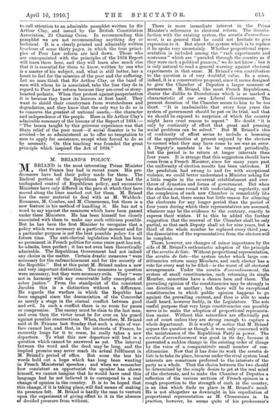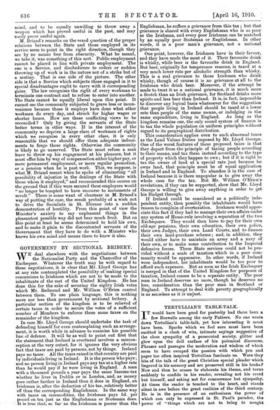M. BRIAND'S POLICY.
MBRIAND is the most interesting Prime Minister that France has had in recent years. His pre- decessors have had their policy made for them. The Radical portion of the Republican Party has had the undisputed control of Republican policy, and successive Ministers have only differed in the pace at which they have moved along the lines marked out for them. M. Briand has the same material to deal with as M. Waldeck- Rousseau, M. Combes, and M. Clemenceau, bat there is a new feature in his method of handling it. He has not a word to say against the measures which have been passed under these Ministers. He has been himself too closely associated with them to make any such criticism possible. But he has been the first Minister to recognise that a policy which was necessary at a particular moment and for a particular purpose is not the best possible policy for all future time. The anti-clerical legislation which has been so prominent in French politics for some years past has not, he admits, been perfect ; it has not even been theoretically admirable. The Republican Government had not indeed any choice in the matter. Certain drastic measures " were necessary for the enfranchisement and for the security of the Republic." But at this point M. Briand makes a new and very important distinction. The measures in question were necessary, but they were necessary evils. They " were not in harmony with any conceivable lofty conception of sober justice." From the standpoint of the consistent Jacobin this is a distinction without a difference. He regards the warfare in which the Republic has been engaged since the denunciation of the Concordat as merely a stage in the eternal conflict between good and evil. In such a conflict there is no room for pause or compromise. The enemy must be slain to the last man, and even then the victor must be for ever on his guard against possible resurrections. When, therefore, M. Briand said at St. Etienne last Sunday that such a state of war- fare cannot last, and that, in the interests of France, he earnestly longs for it to cease, he really takes a new departure. To what this new departure will lead is a question which cannot be answered as yet. The interval between the word and the deed may be long, and the implied promise may never reach its actual fulfilment in M. Briand's' period of office. But none the less his words hold out a hope which has long been wanting in French Ministerial speeches ; and when we remember how consistent an opportunist the speaker has shown himself, we cannot imagine that he would have used this language had he not believed it to correspond to a real change of opinion in the country. It is to be hoped that this change, if it is taking place, will find means of making its presence felt. M. Briand is hardly the man to venture upon the experiment of giving effect to it in the absence of decided pressure from without. There is more immediate interest in the Prime Minister's references to electoral reform. The dissatis- faction with the existing system, the scrutin &arrondisse- ment, is so general that he could not hesitate to give expression to it. But about the system which is to replace it he spoke very uncertainly. Whether proportional repre- sentation is included among the " rash experiments and nostrums " which are " paraded through the country as if they were each a political panacea," we do not know ; but it is only natural to read a general warning against electoral experiments in that sense. M. Briand's own contribution to the question is of very doubtful value. In a sense, indeed, it is a conservative proposal, since it seems designed to give the Chamber of Deputies a larger measure of permanence. M. Briand, like most French Republicans, shares the dislike to Dissolutions which is so marked a, characteristic of our own Liberal Government. The present duration of the Chamber seems to him to be too short. "It is inadmissible that every four years the system of government should be put on its trial, and that we should be exposed to surprises of which the country might have cruel reason to repent." No doubt " it is only by continuity of effort that great and pressing social problems can be solved." But M. Briand's idea of continuity of effort seems to include a lessening of the opportunities at present enjoyed by the electors to correct what they may have come to see was an error. A Deputy's mandate is to be renewed periodically, but the period is to return at longer intervals than four years. It is strange that this suggestion should have come from a French Minister, since for many years past the uniformity of election results has been unbroken. If the pendulum had swung to and fro with exceptional violence, we could better understand a Minister asking for a little respite in the recurrent establishment and over- throw of dynasties and forms of government. But when the elections come round. with undeviating regularity, and the complexion of each new Chamber is remarkably like that of the last, there seems but little reason for silencing the electorate for any longer period than the period of four years during which their representatives are assumed, whatever may be the evidence to the contrary, exactly to express their wishes. If to this be added the further suggestion that the renewal of the Chamber shall be only partial, so that each Deputy shall sit for nine years, but a third of the whole number be replaced every third year, the dissociation of the representatives from the electors will be complete.
These, however, are changes of minor importance by the side of M. Briand's enthusiastic adoption of the principle of the scrutin de lists. Without proportional representation, the scrutin de lisle—the system under which large con- stituencies return many Members, and each elector has a vote for every seat to be filled—is the worst of all electoral arrangements. Under the scrutin d' arrondissement, the system of small constituencies, each returning its single Member, minorities have a chance here and there. The prevailing opinion of the constituencies may be strongly in one direction or another ; but there will be exceptional constituencies in which public opinion happens to go against the prevailing current, and thus is able to make itself heard, however feebly, in the Legislature. The sole useful purpose that very large constituencies can possibly serve is to make the adoption of proportional representa- tion easier. Without this minorities are effectually put out of court unless they are strong enough to capture a whole department. It is worthy of notice that M. Briand argues the question as though it were only concerned with the maintenance of the Republican Party in power. The scrutin d' arrondissement was good in its day, because it prevented a sudden change in the existing order of things by the voice of a comparatively small number of con- stituencies. Now that it has done its work the scrutin de lists is to take its place, because under the rival system local interests are sometimes preferred to the interests of the party as a whole. That the choice between the two should be determined by the simple desire to get at the real mind of the electorate, and to make the Chamber of Deputies a reflection of the various sections of French opinion in a rough proportion to the strength of each in the country, is an idea which finds no place in M. Briand's mind. He is not altogether as downright in his repudiation of proportional representation as M. Clemenceau is. In practice, however, he seems quite of his predecessor's mind, and to be equally unwilling to throw away a weapon which has proved useful in the past, and may easily prove useful again. M. Briand's remarks on the vexed question of the proper relations between the State and those employed in its service seem to point in the right direction, though they are by no means free from obscurity. What he meant, we take it, was something of this sort. Public employment cannot be placed in line with private employment. The one is a Service, and disobedience to orders or sudden throwing up of work is in the nature not of a strike but of a mutiny. That is one side of the picture. The other side is that a Service which subjects those engaged in it to special disadvantages ought to carry with it corresponding gains. The law recognises the right of every workman to terminate one contract and to refuse to enter into another. The State cannot be equally liberal upon this point. It cannot see the community subjected to grave loss or incon- venience because those it employs have done what other workmen do every day, and struck for higher wages or shorter hours. How are these conflicting views to be reconciled ? Only by giving the servants of the State better terms in other ways. If in the interest of the community we deprive a large class of workmen of rights which we recognise in every other class, it is only reasonable that we should offer them adequate induce- ments to forgo those rights. Otherwise the community is likely to go unserved. The State must refuse a man leave to throw up his engagement at his pleasure, but it must offer him by way of compensation either higher pay, or more permanent employment, or more regular promotion, or a pension when he is past work. This, we suppose, is what M. Briand meant when he spoke of eliminating " all possibility of injustice in the dealings of the State with those whom it employed," and recommended this course on the ground that if this were secured these employees would " no longer be tempted to have recourse to movements of revolt." There is some want of clearness in M. Briand's way of putting the case, the result probably of a wish not to drive the Socialists in St. Etienne into a sudden demonstration of hostility. From this point of view the Minister's anxiety to say unpleasant things in the pleasantest possible way did not bear much fruit. But on this point at least he seems determined to hold his own, and to make it plain to the discontented servants of the Government that they have to do with a Minister who knows his own mind and means them to know it also.















































 Previous page
Previous page